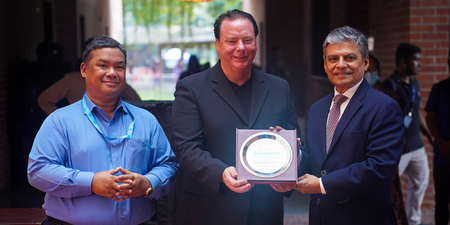Brought to you by Jobs.ie.
Find out what employers look for in a cover letter.
There are a few things that you simply have to have when you’re on the job hunt. Having a good cover letter is right up there.
To give you an insight into an employers perspective on this, we spoke to Aoife Kearns and Jane Callen who work in Talent Acquisition for Aramark. This multinational company provides a wide range of business to business services all over the world including food services, facilities and property management.
We asked Aoife what she looks for in an ideal cover letter and got some inside tips on the hiring process from an employer’s point of view.
What are the biggest no-no’s when writing a cover letter?
The biggest no-no for me is a generic cover letter that has been found on the internet. It’s okay to search the internet for some guidelines and some examples to get you started but don’t copy and paste them. This will mean that you probably have the same cover letter as the majority of others applying for the role. A cover letter should be specific to the role and company that you are applying for.
You’d be surprised how many cover letters I’ve received that are addressed to another company or state the wrong job title. This highlights a lack of attention to detail straight away, which is a key skill that employers look for. Make sure your letter has no spelling, typing, or grammatical errors.
Is it better to play it safe when doing up a job application or to be more experimental in order to stand out?
We all want to stand out from the crowd and be different but sometimes we can overdo this when it comes to a job application. It is okay to consider different approaches to a job application and to experiment a little. Put your own stamp on it, but make sure that it looks professional and that it’s easy to read.
I’ve seen some stand out CV’s over the years but more often than not they are not an easy read e.g. the wrong font used, not easy to follow, no clear headings etc. That means the recruiter has to spend a lot longer trying to figure out if that particular candidate is a fit for the role. More often than not, recruitment professionals are dealing with high volumes of roles and applications and don’t always have the extra time.

What are the best ways to get yourself noticed when applying for a job?
We receive a large volume of applications for most roles that we advertise. The recruitment team then have the job of reviewing each CV that comes through and ensuring we give everyone a fair chance. The best way to get noticed is to ensure that you are applying for roles that are relevant to your experience. This may sound quite simple and boring but it is so true.
For example, we often see applicants with no experience applying for managerial roles. Know the level that you are at and apply for relevant roles. Make it easy for the company to understand your salary expectations so everyone is on the same page.
People are often scared of answering this at application stage but it really isn’t a scary question. Candidates will not be discounted because of it.
One really good way to get noticed is to approach the recruiter working on the role directly once you’ve applied for the role. This can be done via LinkedIn or by a direct call to the company.
This way you start to build a relationship with them. Even if you’re not suitable for the original role that you applied for, they may have something else in mind for you.
Do you have any examples of particularly strange job applications or cover letters that you’ve received?
I don’t have any specific examples of strange applications but what I do often see are photos on CVs. While having a photo on your CV is perfectly fine, it needs to be a professional photo.
Some photos are best left to personal social media accounts. Things to avoid would be photos of you socialising, selfies etc. If you really want to include a photo, get your suit on and get a family member or a friend to take a professional photo of you against a white wall.
Which should take priority in a cover letter – experience or personality?
I think that it should be a balance of both but predominately we want your personality to shine through as we are going to see all of your professional experience listed on your CV.
What advice would you have for someone looking to start a career in your industry?
As Aramark are a business-to-business services company, we operate across three main industries which are food services, workplace solutions (facilities management) and property services. The MD from each division has given the following advice:
Shane Flynn, Managing Director, Aramark Food Services: “Work hard – it’s 99% perspiration, 1% inspiration. Be positive – everyone likes to work with positive people and get broad experience.”
Louise Phillips, Managing Director, Aramark Property Services: “My advice would be to try to join a practice that will give you exposure to as many of the different aspects of property as possible to find out what suits you best.
The property industry covers a wide range of fields including valuations, rent reviews, rating work, property management, asset management, acquisitions, disposals and lettings. The type of work varies enormously and it is important to find your preferred metier.
“I would also suggest that gaining exposure to the way in which property finance and funding works is very helpful to understanding clients’ requirements and what can drive the industry trends. Ideally, spend some time both in one of the large well-known firms and in a small practice.
This will give a real insight into the top class professional world and also a real grounding at the coal face. If I was recruiting, I would like to see someone who had experienced both ways of working.”
Roger Brennan, Managing Director, Aramark Workplace: “You need to love it to succeed. Facilities management is about operational excellence, energy and sustainability, relationship management, collaboration – at some level, we touch everything in the working environment.”
Are cover letters the first thing you look at when reviewing job applications?
If I am being totally honest, covers letters are the last thing that I look at. What I am interested in is the CV. This is what gives me the most important information on the candidates’ experience and education. At Aramark, we don’t expect candidates to apply with a cover letter.
At application stage, the candidate has the opportunity to write a few lines to accompany their CV, but it is not a compulsory section in the application process. We want to make the application process quick and easy for candidates – if not, we risk losing them at the application stage.

What’s the biggest misconception people have about working in your industry?
As we are in the services industry, people often don’t realise that there are amazing opportunities in this industry and that they can come your way very frequently. There are great career opportunities for anyone with the right attitude and work ethic and it is a very exciting place to be.
Within Aramark, there are so many options, from marketing, HR and procurement to culinary, operations, facilities and property management.
As well as this, a lot of people don’t realise how fast-paced our industry can be and just how big our company is. Aramark Northern Europe employs approximately 20,000 people and I can tell you that no two days are ever the same.
Is there any other general advice that you might have for potential candidates
Take time completing your application, research the businesses that you are applying to and go the extra mile to make your application stand out. Don’t send your CV out to every job that you see advertised, know where you want to be in your career and go for it. Most importantly, get your CV right. My tips for this would be:
- Ensure that your CV is clear, concise and easy to read
- Have clear headings for each job that you have had
- Clearly state the dates of employment for each of your roles
- Use bullet points to highlight your key responsibilities
- Highlight any professional or personal key achievements
- If you want to include a photo, ensure it’s a professional one
- And finally, remember that your CV is the passport to your career, make sure it sells you in the best possible light.
Find your perfect job from the thousands available on Jobs.ie right now. You’ll find vacancies from companies of all sizes and sectors in every part of Ireland. Your next job is waiting for you. Start your job hunt now.
Brought to you by Jobs.ie.






















































